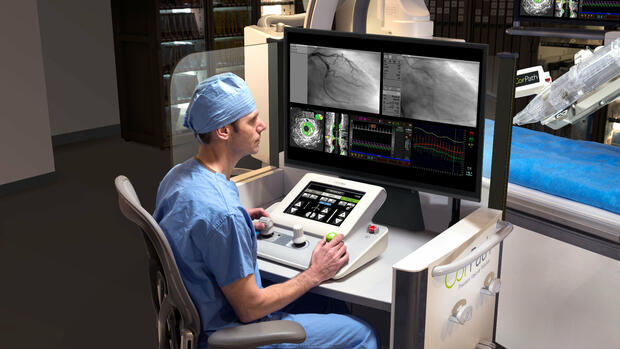The robotic systems of the Siemens Healthineers subsidiary have not caught on in cardiology.
(Photo: ©2016 Bill Truslow)
Munich Siemens Healthineers spent more than one billion dollars acquiring the robotic medical technology specialist Corindus Vascular almost three years ago. Now the Siemens subsidiary has to admit that the associated hopes for the future have not been fulfilled, at least in part.
Also due to the realignment of the still very small segment, profit after tax in the second quarter of the 2022/23 financial year (ending on September 30) fell by 81 percent compared to the same period last year to EUR 108 million. This is due to expenses for Corindus amounting to 329 million euros, including depreciation, but also costs for the buyback of robot-supported systems that have already been sold.
The other businesses of the Dax group are going well – however, as expected, group sales fell by a comparable 2.5 percent to a good 5.3 billion euros due to the falling demand for corona tests.
Corindus Vascular: Heart treatment with the joystick is rarely used
Corindus specializes in the technology for robot-assisted, minimally invasive vascular surgery procedures – the technologies are considered major growth areas in medical technology. So far, the systems can be used in the endovascular area in cardiac surgery. If a vascular support, i.e. a stent, has to be placed in the event of a thrombosis, the doctor can now do this from the next room with a joystick. The procedure is more precise, faster – and the doctor is exposed to less radiation.
However, the systems of the pioneer Corindus have not yet been able to establish themselves in heart surgery, partly because some doctors still prefer to carry out the procedures themselves.
Therefore, Siemens Healthineers is now withdrawing from this endovascular cardiology business. Some of the devices sold were only used very little. Healthineers now wants to buy them back in order to save on the costs of the service in the future.
With the systems for cardiology, which are already ready for the market, Siemens Healthineers wanted to bridge the time until systems for vascular interventions in neurology are ready for the market. The actual long-term goal of the Corindus takeover was these devices for significantly more demanding stroke treatments.
Siemens Healthineers: The diagnostics division is making losses
Overall, business at Siemens Healthineers is currently going according to plan. In the second quarter, sales adjusted for the corona effect increased by a good eleven percent on a comparable basis. Adjusted operating profit (EBIT) fell by 30 percent to 681 million euros. Analysts had expected an average of around 700 million euros here.
But Healthineers’ diagnostics division made an operating loss of 110 million euros. The division is being restructured after the demand for corona tests collapsed with the end of the pandemic.
Roche: The competition is also suffering from a slump in sales
Roche had also felt the waning demand for corona tests. Swiss sales in the diagnostics division fell by 31 percent to CHF 3.6 billion in the first quarter. Roche CEO Thomas Schinecker emphasized that the company is on course for growth if you factor out the corona effect.
The Healthineers competitor Philips had exceeded expectations with a sales increase of six percent to 4.2 billion euros. More orders in diagnostics and treatment offset weaker orders in the healthcare connectivity business.
Philips for provisions with a large net loss
But Philips made a high net loss of 665 million euros because of expensive provisions. The group set aside 575 million euros for legal disputes in the USA relating to the recall of ventilators and devices for sleep therapy. Additional costs were also incurred for the ongoing austerity program with thousands of job cuts.
Healthineers boss Bernd Montag confirmed the forecast for the full year. Sales should stagnate. If you factor out the special boom with the corona tests, this would be an increase of six to eight percent in the other shops. Healthineers expects adjusted basic earnings per share to fall slightly to between EUR 2.00 and EUR 2.20. However, expectations for the diagnostics segment have been lowered somewhat.
Siemens Healthineers had benefited greatly from the demand for rapid tests during the Corona period. In addition, sales grew as a result of the Varian takeover. Healthineers acquired the US cancer therapy specialist for $16 billion in the largest acquisition in Siemens history.
This is one of the reasons why Healthineers was able to increase sales by more than 20 percent to EUR 21.7 billion for the first time in the 2020/21 financial year. Adjusted for portfolio and currency effects, growth was 5.9 percent. The operating result adjusted for special effects rose by 16 percent to 3.7 billion euros. This corresponded to a margin of 16.8 percent.
More: This is how Healthineers boss Monday answered questions from high school students
